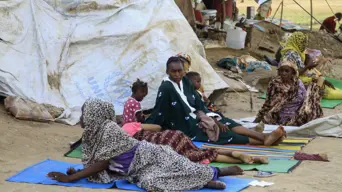Children reduced to 'skin and bones' in war-torn Sudan: UN
AFP
5 August 2025 | 16:37The Sudanese army, at war with the paramilitary Rapid Support Forces since April 2023, recaptured Khartoum state in May, but widespread hunger continues to grip the heart of Africa's third-largest country.

People already displaced by conflict, rest by tents at a makeshift campsite they were evacuated to following deadly floods in the eastern city of Kassala onA 11 August 2024. Picture: AFP
PORT SUDAN - Hungry children in war-torn Sudan's capital have been reduced to "skin and bones", and thousands of families are at risk of starvation in a western city under a months-long siege, the UN said Tuesday.
The Sudanese army, at war with the paramilitary Rapid Support Forces (RSF) since April 2023, recaptured Khartoum state in May, but widespread hunger continues to grip the heart of Africa's third-largest country.
"Malnutrition is rife, and many of the children are reduced to just skin and bones," UNICEF's Sheldon Yett said Tuesday after visiting Sudan, where the world's largest hunger crisis is unfolding, with nearly 25 million people suffering dire food insecurity.
The epicentre of the crisis, however, is the besieged North Darfur state capital of El-Fasher, more than 1,000 kilometres (620 miles) west of Khartoum, where thousands are in danger of starvation, the UN's World Food Programme said Tuesday.
"Everyone in El-Fasher is facing a daily struggle to survive," said Eric Perdison, the WFP's regional director for eastern and southern Africa.
The RSF has besieged and sought to seize El-Fasher, the only major city in Darfur still under army control, since May 2024.
"People's coping mechanisms have been completely exhausted by over two years of war. Without immediate and sustained access, lives will be lost," Perdison said in a statement.
READ: Sudan accuses UAE of bringing in Colombian mercenaries to support RSF
The WFP said food prices had soared by 460 percent compared to the rest of the country, forcing soup kitchens to shut while aid remains blocked.
Famine was declared a year ago in the displacement camps surrounding El-Fasher, and the UN estimated it would take hold in the city itself by last May. A lack of data has prevented an official famine declaration.
An attack on a UN humanitarian convoy heading towards El-Fasher in June killed five aid workers.
"We have not had access to the horrible situation unfolding in El-Fasher, despite trying for months and months and months," Yett told reporters in Geneva on Tuesday, adding "we have not been able to get supplies there".
Civilians are reportedly surviving on animal fodder and food waste, with nearly 40 percent of children under five acutely malnourished, according to UN figures.
DAILY SURVUVAL A STRUGGLE
Civilians in El-Fasher -- who hide from shelling in makeshift bunkers -- continue to come under fire as the RSF presses an assault to consolidate control over the entire Darfur region.
Its most recent major attack in April killed hundreds in the Zamzam displacement camp just outside El-Fasher, forcing hundreds of thousands to flee to the city and the nearby town of Tawila, where a devastating cholera outbreak now rages.
"Every day the conflict continues in Sudan, innocent lives are lost, communities are torn apart, and trauma continues to haunt generations," the UN's expert on human rights in Sudan, Radhouane Nouicer, said Tuesday.
"The ongoing war has devastated civilian lives and turned daily survival into a constant struggle."
Relative calm may have returned to Khartoum, but children there still have only "limited, but growing access to safe water, food, healthcare and learning", according to UNICEF's Yett.
In the two hardest-hit areas of Khartoum state, Jebel Awliya and Khartoum proper, "children and families in the neighbourhood are sheltered often in small, damaged or unfinished buildings", he added.
The war, now in its third year, has killed tens of thousands across Sudan, displaced millions and left the country's healthcare system in ruins.
It has created what the UN describes as the world's largest displacement and hunger crises.
The world body expects some two million people will return to Khartoum this year, but many will find a devastated city.
"Children are dying from hunger, disease and direct violence," said Yett, calling it a "looming catastrophe".
"We are on the verge of irreversible damage to an entire generation of children."
Get the whole picture 💡
Take a look at the topic timeline for all related articles.

















